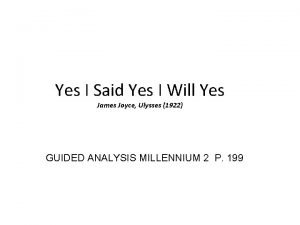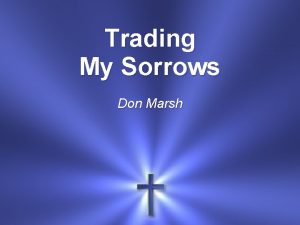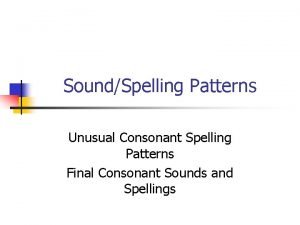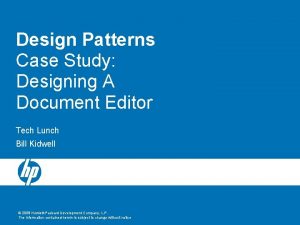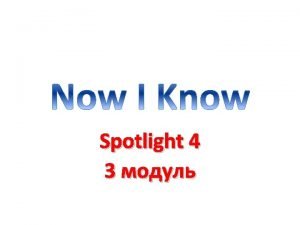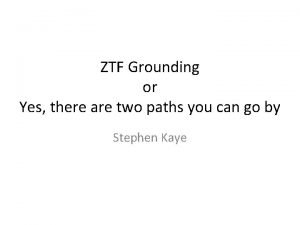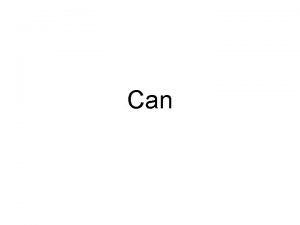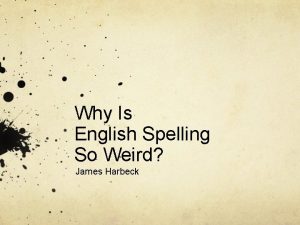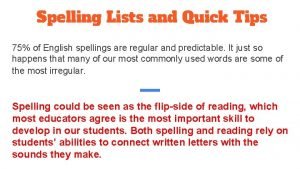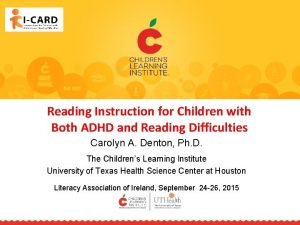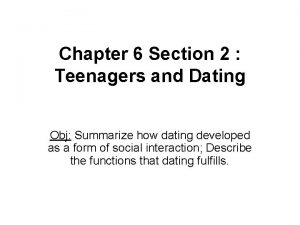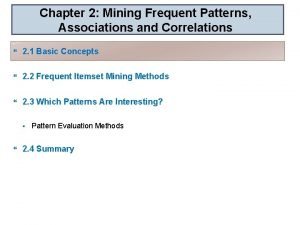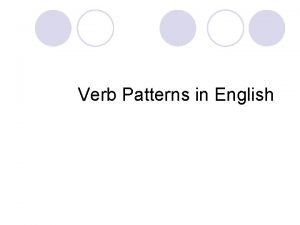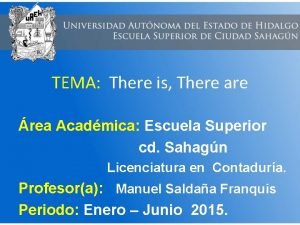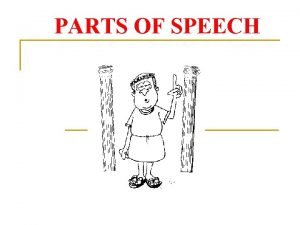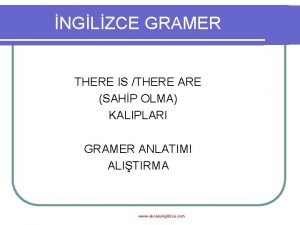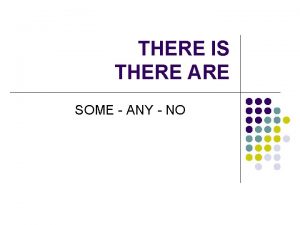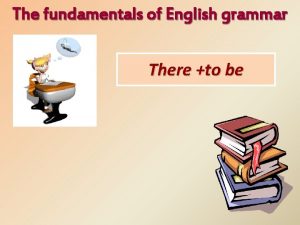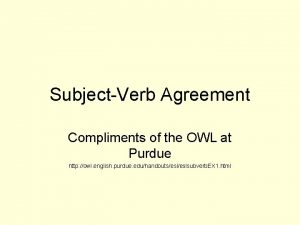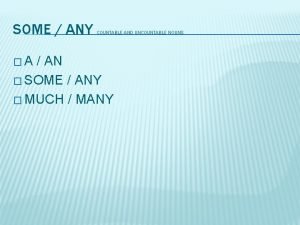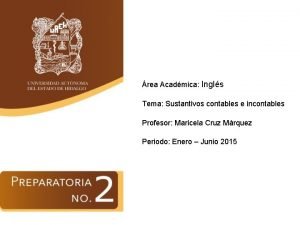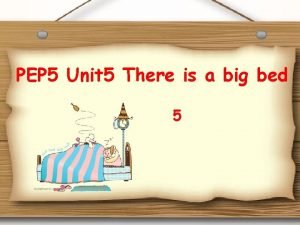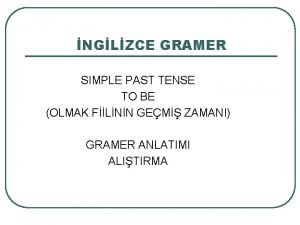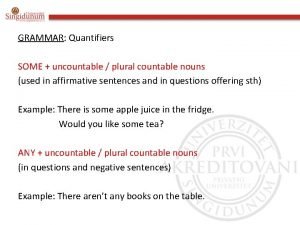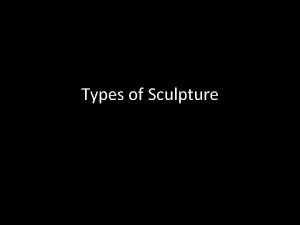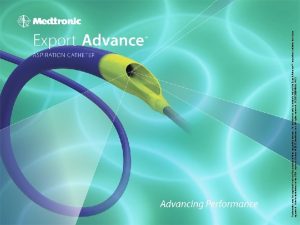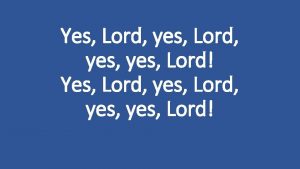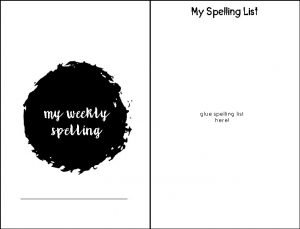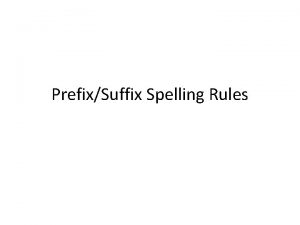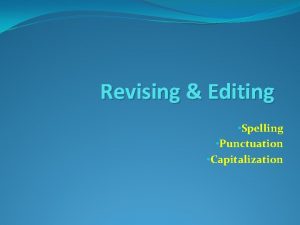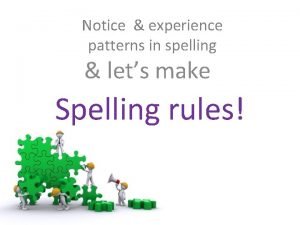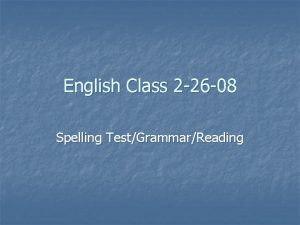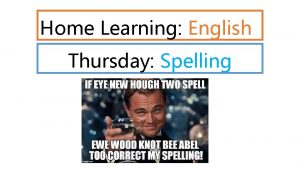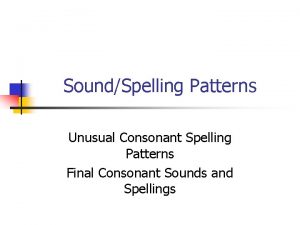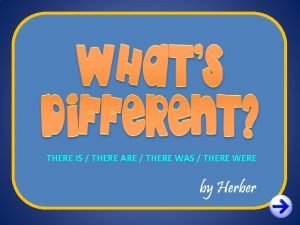Yes There ARE Patterns to English Spelling Advance











































- Slides: 43

Yes, There ARE Patterns to English Spelling! ©Advance Consulting for Education, INC.

Why Spelling? ©Advance Consulting for Education, INC.

Agenda 1. Why is Spelling Important? 2. What is Spelling? 3. Patterns, What Patterns? 4. What are the Historical Influences on English Spelling? 5. How Should We Teach Spelling? ©Advance Consulting for Education, INC.

Why is Spelling Important? Spell check doesn’t identify all errors! Good spellers are good readers. Good spellers are good writers. Good spellers use a greater range of vocabulary. • Good spellers are perceived as professional and competent. • • ©Advance Consulting for Education, INC.

What is Spelling? “Spelling is the application of phonemic awareness and alphabetic knowledge to letters in an accepted orthographic or writing system. ” Sayeski (2011) ©Advance Consulting for Education, INC.

What is Spelling? Spelling Knowledge and Skills Phonemic Awareness *Hear and differentiate phonemes ©Advance Consulting for Education, INC. Alphabetic Knowledge *Recognize, name and produce letters Orthographic Awareness *Map sounds using letters

What is Spelling? Additional spelling knowledge and skills: • Morphemes • Syllables • Grammar and syntax • Semantic organization at the word, phrase, sentence and discourse levels ©Advance Consulting for Education, INC.

What is Spelling? Spelling Processing Phonological Processing *Assembling the word piece by piece ©Advance Consulting for Education, INC. Orthographic Processing *Visual memory of the word

Patterns, What Patterns? Phonemicity is the degree to which we can predict the spelling of a word from its pronunciation and the pronunciation of a word from its spelling. ©Advance Consulting for Education, INC.

Patterns, What Patterns? Transparent Opaque Orthography Orthography ©Advance Consulting for Education, INC.

Patterns, What Patterns? The Chaos by Gerard Nolst Trenité Dearest creature in Creation, Studying English pronunciation, I will teach you in my verse Sounds like corpse, corps, horse, and worse. I will keep you, Susy, busy, Make your head with heat grow dizzy; Tear in eye, your dress you'll tear; So shall I! Oh, hear my prayer. ©Advance Consulting for Education, INC.

Patterns, What Patterns? Homophones are words that are pronounced the same but have a different meaning, whether they have the same spelling or not. heir and air read and red ©Advance Consulting for Education, INC.

Patterns, What Patterns? Homographs are words that are written the same but have a different meaning and usually origin, whether they are pronounced the same way or not. bear ‘to carry’ and bear ‘animal’ lead ‘to conduct’ and lead ‘metal’ ©Advance Consulting for Education, INC.

Patterns, What Patterns? Homonyms are words that are both homophones and homographs. They are exactly the same as another in sound and spelling but different in meaning. lean ‘to prop against’ and lean ‘thin’ ©Advance Consulting for Education, INC.

Patterns, What Patterns? English appears to have more opaque orthography than it really does because a high percentage of its high frequency words are irregular. The overall percentage of total words that are irregular is much smaller than it seems. Reasons for the lack of phonemicity are largely historical. ©Advance Consulting for Education, INC.

What are the Historical Influences on English Spelling? Anglo Saxon ©Advance Consulting for Education, INC. Norse French/ Latin Other Languages Greek

What are the Historical Influences on English Spelling? Norse Spelling Patterns slaughter, slight, tight wheeze, whirl wreck, wrong ©Advance Consulting for Education, INC.

What are the Historical Influences on English Spelling? Norse Spelling Patterns kid, kilt, kindle scab, scale, scare, scout knife, knee ©Advance Consulting for Education, INC.

What are the Historical Influences on English Spelling? Latin/French Spelling Patterns faction, satisfaction, auction, rejection, diction nation, aviation, calculation, cancelation familiar, peculiar ©Advance Consulting for Education, INC.

What are the Historical Influences on English Spelling? Latin/French Spelling Patterns necessary, ordinary, secretary millionaire, questionnaire ©Advance Consulting for Education, INC.

What are the Historical Influences on English Spelling? Greek Spelling Patterns anthology, anthropology, arithmetic, athlete, authentic, enthusiastic, ether, ethic, marathon, method, myth, theatre, theme philosophy, photography, phobia, graph, audiophile ©Advance Consulting for Education, INC.

What are the Historical Influences on English Spelling? Greek Spelling Patterns diphtheria, diphthong, ophthalmic hymn, hygiene, hysteria, hydro-, hyperaura, austere, authentic, centaur, nausea ©Advance Consulting for Education, INC.

What are the Historical Influences on English Spelling? Good websites for lists of words with specific patterns: www. morewords. com www. scrabblefinder. com ©Advance Consulting for Education, INC.

What are the Historical Influences on English Spelling? 1. 2. 3. 4. 5. The use of Latin alphabet. The work of individual scribes. The advent of the printing press. The Great Vowel Shift. Initiatives to restore historical spellings of words. 6. Initiatives to standardize spelling. 7. Initiatives to align spelling to sound. ©Advance Consulting for Education, INC.

What are the Historical Influences on English Spelling? History of English in 10 Minutes http: //www. youtube. com/watch? v=Sf. K hl. JIAhew English: Birth of a Language http: //www. youtube. com/watch? v=Vs. Vz 5 U 76 k. X 0 ©Advance Consulting for Education, INC.

What are the Historical Influences on English Spelling? For a detailed look at the origins of English spelling: Crystal, David. 2012. Spell it Out. New York: St. Martin’s Press. Upward, Christopher and Davidson, George. 2011. The History of English Spelling. Wiley-Blackwell. ©Advance Consulting for Education, INC.

How Should We Teach Spelling? Incidentally, as errors or challenges occur. Targeted and systematically by word: move from less complex words to more complex words, on a graded or levelled scale. ©Advance Consulting for Education, INC.

How Should We Teach Spelling? Targeted and systematically by letter patterns: move from more commonly occurring patterns to less commonly occurring patterns. Targeted and systematically by sounds: move from more commonly occurring sounds to less commonly occurring sounds. ©Advance Consulting for Education, INC.

How Should We Teach Spelling? Four key elements to spelling instruction: 1. Systematic study strategies. 2. Immediate, corrective feedback. 3. Repeated practice. 4. Teaching of patterns. ©Advance Consulting for Education, INC.

How Should We Teach Spelling? Activity 1: Match words together that have the same vowel sounds in them: sound though bought cough rough generous adjourn thought borough plough bound labour ©Advance Consulting for Education, INC. group throught account foul mouse

How Should We Teach Spelling? Though Through /əU/ /u: / Cough, Ought Rough Plough Adjourn /ɒ / /Λ/ /a. U/ /з: / ©Advance Consulting for Education, INC.

How Should We Teach Spelling? Activity 2: Match words together that have the same vowel sounds in them: head laugh seize law girl put rent soon apple heat cook heard prune bottle ©Advance Consulting for Education, INC.

How Should We Teach Spelling? Activity 2: Match words together that have the same vowel sounds in them: head --rent seize--heat girl--heard soon--prune laugh--apple law--bottle put--cook ©Advance Consulting for Education, INC.

How Should We Teach Spelling? Activity 3: Students hunt for words in a reading text that have specific letter combinations. They identify the sound each combination makes. OR Students hunt for words in a reading text that have specific sounds. They identify the letter combinations that make each sound. ©Advance Consulting for Education, INC.

How Should We Teach Spelling? Activity 4: Students work in small groups to create a word map, with a letter combination or sound in the middle, and all of the words they know with that letter combination or sound around the edge. ©Advance Consulting for Education, INC.

How Should We Teach Spelling? Activity 5: Students keep a word study notebook, with one letter combination OR sound on each page. ©Advance Consulting for Education, INC.

How Should We Teach Spelling? Activity 6: Conduct a class dictation using words with the same letter combinations OR the same sounds. ©Advance Consulting for Education, INC.

How Should We Teach Spelling? Activity 7: Conduct a class spelling bee that focuses on specific letter combinations or sounds. ©Advance Consulting for Education, INC.

How Should We Teach Spelling? Activity 8: Students work individually to write a poem on a topic of their choice with a designated sound rhyming pattern. ©Advance Consulting for Education, INC.

How Should We Teach Spelling? Activity 9: Teach spelling through morphemes. Teach the meanings of morphemes: Re = again, ing= when you do something, un = not, est = the most, less = without Teach rules for combining morphemes: For words ending in ‘e’ in order to add a morphograph that begins with a vowel, you must first drop the e from the word. For example, wide + est becomes widest, cure + able becomes curable. ©Advance Consulting for Education, INC.

How Should We Teach Spelling? Sayeski, Kristin L. 2011. Effective Spelling Instruction for Students with Learning Disabilities. Intervention in School and Clinic, 47 (2) 75 -81. Shemesh, R. , & Waller, S. 2000. Teaching English Spelling: A Practical Guide. Cambridge, UK: Cambridge University Press. ©Advance Consulting for Education, INC.

It all Started with Review Stories 1. Why is Spelling Important? 2. What is Spelling? 3. Patterns, What Patterns? 4. What are the Historical Influences on English Spelling? 5. How Should We Teach Spelling? ©Advance Consulting for Education, INC.

Thanks for participating! If you would like a PDF of the presentation slides, please leave your name and e-mail address on the sign-up sheet or leave a business card. www. aceducation. ca www. thepdexchange. ca ©Advance Consulting for Education, INC.
 Yes i said yes
Yes i said yes I m trading
I m trading Cloud cap technologies
Cloud cap technologies Mikael ferm
Mikael ferm The patterns of english spelling
The patterns of english spelling Yes yes lord amen
Yes yes lord amen Unusual spelling patterns
Unusual spelling patterns Multiple look and feel standards
Multiple look and feel standards Yes, there is
Yes, there is Look read and choose the correct sentence
Look read and choose the correct sentence Yes there are two paths
Yes there are two paths Speak english
Speak english English spelling tutor
English spelling tutor Structure of english orthography
Structure of english orthography Middle english spelling
Middle english spelling Why english spelling is so weird
Why english spelling is so weird Words with ei after c
Words with ei after c 44 spelling in english
44 spelling in english Spelling basics
Spelling basics Alphabet over the phone
Alphabet over the phone Dating serves several important functions that include
Dating serves several important functions that include Eclat algorithm
Eclat algorithm They have a flat verb pattern
They have a flat verb pattern Tema there is there are
Tema there is there are There is there are part of speech
There is there are part of speech There is there are negative form
There is there are negative form There is there are
There is there are Some any cheese
Some any cheese There is there are
There is there are The man with all the birds live/lives on my street
The man with all the birds live/lives on my street Demonstrativos
Demonstrativos Some- any
Some- any Workbook es contable o incontable
Workbook es contable o incontable Pep unit
Pep unit Ingilizce gramer zamanlar tablosu
Ingilizce gramer zamanlar tablosu Let's practice the game
Let's practice the game There is there are
There is there are Hay there is there are
Hay there is there are Sightseeing countable or uncountable
Sightseeing countable or uncountable If there is no struggle there is no progress examples
If there is no struggle there is no progress examples Proxytotal
Proxytotal Sculptor persona
Sculptor persona катетер аспирационный export advance
катетер аспирационный export advance Advance science
Advance science
